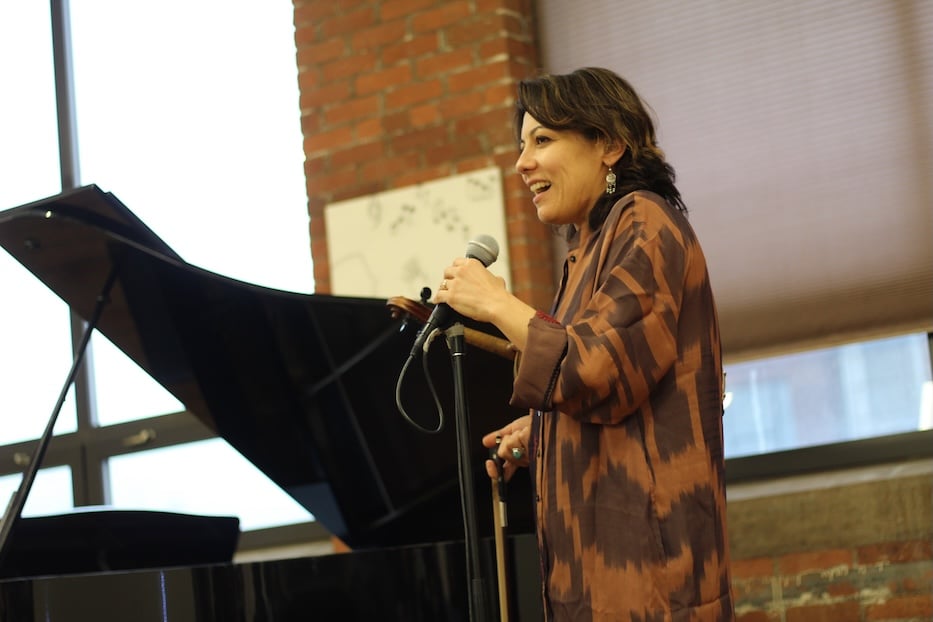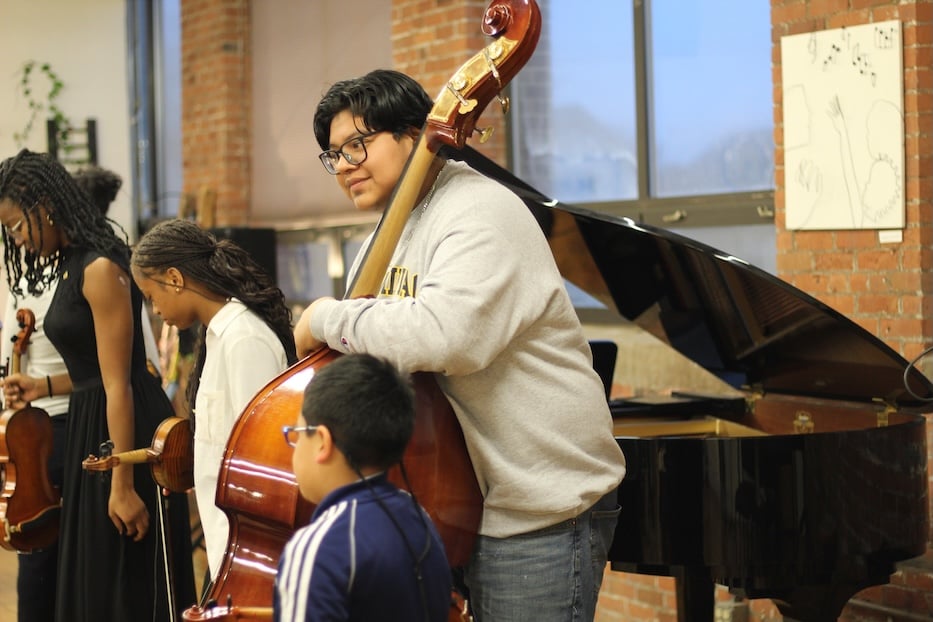
Culture & Community | Erector Square | Fair Haven | Music | Storytelling | Arts & Culture | Music Haven

Yaira Matyakubova, artistic director of the Haven String Quartet. Lucy Gellman Photos.
A violin rang the room into being, its voice urgent, piercing. Then another, not far behind, with the same penetrating cry. If a listener closed their eyes, they could see a wide-winged, resplendent creature, struggling to make its way toward the sun. Another violin entered, bellowing its presence, and the bird flapped forward. Strings became dissonant and it fell, plummeting, back towards the earth.
That sound came to Peck Street on a recent Thursday, as dozens of students, storytellers, and families filled Music Haven's Erector Square home for the conclusion of "Voices: Untold Stories," a year-long collaboration between the Haven String Quartet (HSQ), Music Haven students and immigrant and refugee storytellers across New Haven. The mellifluous brainchild of violinist Yaira Matyakubova, the series has become a testament to the power of shared narrative across both art forms and cultures, particularly in the current moment.
"This is such a beautiful, incredible energy," said Matyakubova, artistic director of the Haven String Quartet and a member of The Knights, a New York-based orchestra that has also participated in the series. "It's sometimes hard to believe in that energy, maybe, when you're just on your own, but when you are all together collectively, it's like, it shines through the person next to you."


The finale has been several months—and a village of support—in the making. Last year, HSQ members kicked off the series with a concert at the Fair Haven Library, instruments and musicians nestled among the shelves as activist Fatima Rojas shared her own journey with meaning, music and migration. In the months that followed, concerts multiplied, with stories that flowed from Iraq to Mauritania to the Democratic Republic of Congo to Afghanistan.
Speakers have included Rojas, Maher Mahmood, Moussa Gueye, Toto Kisaku, and Sima Ensafi, as well as performers from the HSQ, the Knights, and the Dixwell Senior Center. Each time, the concert has been a reminder of the way music can be a window into someone else's lived experience, often without any words at all.
For the final concert, which Matyakubova dubbed a festival, storytelling seemed to come from the instruments themselves, in the able hands of departing students, new teachers and visiting musicians.
"It helps people understand what's going on on the other side of the world," said Gueye, who came to the U.S. from Mauritania in 2004, and moved to New Haven from Iowa five years after that. "Things are different in most parts of the world. When I do art, it's a form of communication."
As a gray, warm dusk began to fall outside, those words came to life over and over again, taking listeners on one more journey before the end of the night. In one moment, they were vibrantly alive in Oscar Peterson's 1962 "Hymn to Freedom," as piano came in so lightly it might as well have been air, then swirled into a measured, twinkling trip through jazz, gospel and Black spirituals.


Adina Salahuddin, a junior at ESUMS, performed a moving cover of Nina Simone's "Feeling Good."
Written in the thick of the Civil Rights movement, the piece captures the sheer miracle of resistance and creation—not over years or a decade, but over centuries.
But what sets it apart—even by Peterson's own reflections, of which he had many before his death in 2007—is how hopeful it is. Nowhere does a listener hear a melody that might stumble and fall or slow to a snail's pace: Peterson doesn't have time for that. While there is a version with lyrics (hear that here), once performed with the famous Malcolm Dodds Singers, this one needed no words at all. In the audience, people listened at the edge of their seats, transported.
In another, students Adina Salahuddin and Nia Antoine embodied it in Nina Simone's "Feeling Good," accompanied by teachers Matyakubova on violin and Phillip Boulanger on cello. As Salahuddin took the mic—she's been preparing for the performance for months—she took the audience back to 1965, when so much of the country and the world felt like it was on the brink of a massive shift. After performing the first verse at a Martin Luther King, Jr. day concert earlier this year, she put her whole body into it, channeling the musician as she closed her eyes and crooned.
In another still, musicians followed the classical, measured pacing of Felix Mendelssohn (a nod to the masterful Andrius Žlabys, who is such a gift to New Haven and to the musical world) with the heart-stirring "Traditional Dance" from Uzbekistan, which has become a Music Haven staple in recent years.
But nowhere was it clearer than in Colin Jacobsen and Siamak Aghaei's "Ascending Bird," written in 2007 and inspired by a Persian folk song that Aghaei learned growing up (listen to it here). While the work is mapped onto the traditional story of a bird who tries to fly up to the sun, the musicians who wrote it have also called it " a metaphor for achieving spiritual transcendence," which the bird in question ultimately does.


Artist Moussa Gueye: "When I do art, it's a form of communication."
"It [the bird] has the audacity to think it can reach the sun, and it doesn't succeed at first, it tries again," said Jacobsen, a member of the Knights who was in town just for the evening. "And then, well, we'll let you decide if it reaches the sun."
He added that the piece, which takes some of its quotations from the bone flute, is inspired by a real-life experience that Aghaei, who grew up in Iran and went on to found the Santur Navazan Ensemble 25 years ago, had in the early 2000s. Some years ago, the composer went to a planetarium with his young son, then about six years old, and saw images of the earth from space. He was struck by how calm it looked from afar.
"It seemed so peaceful, floating there in space, but it [earth] contains everything we care about," Jacobsen said. "And then, you get closer to the surface and you see all the turmoil, the difficult things that we all deal with."
As musicians lifted their instruments to play, that tension hung there, just waiting for the layers to be pulled back. Around them, the room fell into silence, a few programs rustling as listeners turned their attention toward the front. Then violinist Patrick Doane began to play, with a kind of stark almost biting sound that brought the room to attention. Across a semi-circle, viola called back, its voice full of longing.


Cellist Caitlin Sullivan and violinist Colin Jacobsen.
Within seconds, strings unfurled in every direction, each of them waiting to see what the other would do next. As cello entered the mix, they climbed ever higher, until they were the hot, screeching engines beneath a rocketship. They quarreled, dipping in and out of each other, and then stopped just as quickly for a breath.
Smiling, Matyakubova jumped back in, rocking with the sound until it seemed almost prayer-like, meditative. Cajón entered, the drum steady beneath Ian Sullivan’s hands. Suddenly, the work was something else entirely, less bird-like and more propulsive, as if the instruments had paws and sharp teeth. As the sound wrapped around the room, it lingered by artworks from Gueye, Susan Clinard and Linda Mickens, all of whom have connected with musicians in the past years.
The bird, musicians seemed to say, wasn’t finished. Not even close. And neither were they. Folding in nods to folk music, Iranian mythology and storytelling, and oral tradition more broadly, they pressed forward until the audience, spellbound, burst into applause.
The message in between each note—that we will be okay, if we can just listen to each other and honor what we hear—reverberated through the space as attendees tucked into Afghan food and made time for conversation, some standing with plates in one hand as they gesticulated wildly with the other.
Around an L-shaped hallway, kids played in an empty practice room. Students Yovahni Cruz and Abraham Perez, who had spoken earlier in the evening, chatted by a cluster of chairs. It felt, for a moment, like everything was right with the world.
“Honestly, to get to do this ‘Voices’ project, and to get to do the new piano lessons, for our last year has just been really great,” Cruz, who has grown from a starry-eyed middle schooler into a sharp teaching assistant, had said just 20 minutes earlier. “And I’m so glad to be a part of Music Haven for pretty much all my life.”
Music Haven's next concert, "Love In Bloom," with Resident Pianist Jacob Wang, takes place April 26 at 315 Peck St., Bldg. 5. For more about the organization, including events, click here.

